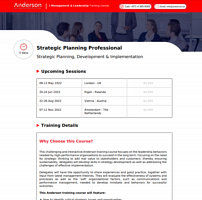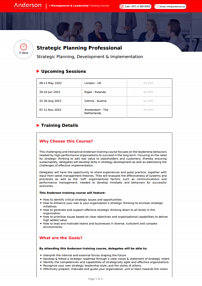- Course Finder
- Formats
- Training Topics
- Business Strategy
- Management & Leadership
- Personal Development Skills
- Innovation & Creativity
- Emotional Intelligence
- Corporate Governance and Compliance (GRC)
- Project Management
- Contract Management
- Risk Management
- Business & Life Synergy
- Business Agility
- Business Sustainability
- Digital Transformation & Savviness
- Executive & Administrative Support
- Customer Service
- Sales & Marketing
- Human Resource HR Management
- Finance & Budgeting
- Data Science and Protection
- CertNexus
- Special Courses
- 10 Day Seminars
- The Essential Skills
- The Advanced Skills
- The Mini MBA Series
- Bootcamps
- Training Venues
- Certificates
- Calendars
- About us
- الدورات العربية
Upcoming Sessions
| 06-10 Jan 2025 | Online | $3,950 |
| 26-30 May 2025 | Online | $3,950 |
| 06-10 Oct 2025 | Online | $3,950 |
The training course is also available in Classroom format. Discover the dates
View Classroom formatOnline Training Course Overview
This contemporary and innovative online training course will utilise the latest research and examples of best practices to explain reward strategies from an administrative, strategic, and human perspective. Managing reward is directly linked to performance, productivity, retention, attitude, and the overall health of an organisation.
Compensation, pay, benefits, salary, and praise make up what is called ‘reward’. Reward is an integral and vitally important part of the structure of any organisation, from small to large and from government to private.
This Anderson online training course will feature:
- Reward from an administrative, strategic, and people perspective
- How to design reward and compensation to suit the culture of your workplace
- The strategic impact of motivation of people
- How HR can design a reward system that assists the organisation in achieving its objectives
- A “toolkit” of useful tools and practices that you can use after the course
Online Training Course Objectives
By the end of this Anderson online training course, participants will be able to:
- Describe the economic, psychological, and motivational concepts that influence reward
- Discuss the role of reward strategies and policies in an organisation
- Assess their own organisation for fairness and equity
- Defend the case for non-financial rewards in attracting, retaining, and motivating people
- Outline the benefits of a total-reward approach to compensation
Designed For
This Anderson online training course is suitable for a wide range of professionals but it will greatly benefit:
- Human Resource Professionals
- Those working in or recently transferred to compensation, benefits, or reward positions
- HR staff who are responsible for the administration of benefits or reward
- HR Business Partners
- Anyone involved in salary, pay, and conditions of work
- Managers involved in reward issues
Learning Methods
This very practical Anderson online training course will utilise a variety of proven adult learning techniques to ensure maximum understanding, comprehension, and retention of the information presented. This includes a very interactive presentation style and individual & group activities. Case studies will highlight the major teaching features. Role-Play and feedback will also be utilised to ensure goals are achieved.
Day One: The Context of Compensation, Benefit Administration and Reward Management
- Introduction to Compensation, Benefits Administration & Reward Management
- The psychological contract
- Total reward concepts and approaches
- Reward Strategy -Identifying what it looks like
- Human Resource Strategies and Policies
- Pay philosophy and compensation strategy
Day Two: Administration of Reward Equality and Inequality in Pay
- The administration of reward
- Salary and pay surveys
- Job evaluation
- Equality in reward
- Inequality in reward– causes and solutions
- Executive pay & Executive pay gap recording
Day Three: Performance, Performance Related Pay and Motivation
- Performance Management
- Development and training
- Performance related pay
- Current best practice examples
- Contribution related pay
- Case study of reward practice at Netflix
Day Four: Non-financial Rewards and Empowerment Employee Benefits
- Non-financial rewards
- Employee Participation
- Employee Engagement
- Employee Benefits
- Flexible benefit systems and Cafeteria rewards
- The role of Pensions
Day Five: Total Remuneration Creating a Reward Strategy
- Total Remuneration for the whole organisation
- Improved performance of the organisation and individual
- Developing a reward strategy
- CIPD Pay management survey
- Review of the Murlis and Wright model of Total rewards
- Personal action planning
| 10:30 - 11:00 | : | Welcome, Setup, Registration |
| 11:00 – 12:30 | : | First Session |
| 12:30 – 12:45 | : | Break (15 minutes) |
| 12:45 – 14:15 | : | Second Session |
| 14:15 – 14:30 | : | Break (15 minutes) |
| 14:30 – 16:00 | : | Third Session |
- An Anderson e-Certificate will be provided to delegates who attend and complete the online training course
- The HRCI Approved Provider Seal and the corresponding Recertification Credit Hours Awarded will be reflected on the Certificate of Completion
Online Training Course Overview
This contemporary and innovative online training course will utilise the latest research and examples of best practices to explain reward strategies from an administrative, strategic, and human perspective. Managing reward is directly linked to performance, productivity, retention, attitude, and the overall health of an organisation.
Compensation, pay, benefits, salary, and praise make up what is called ‘reward’. Reward is an integral and vitally important part of the structure of any organisation, from small to large and from government to private.
This Anderson online training course will feature:
- Reward from an administrative, strategic, and people perspective
- How to design reward and compensation to suit the culture of your workplace
- The strategic impact of motivation of people
- How HR can design a reward system that assists the organisation in achieving its objectives
- A “toolkit” of useful tools and practices that you can use after the course
Online Training Course Objectives
By the end of this Anderson online training course, participants will be able to:
- Describe the economic, psychological, and motivational concepts that influence reward
- Discuss the role of reward strategies and policies in an organisation
- Assess their own organisation for fairness and equity
- Defend the case for non-financial rewards in attracting, retaining, and motivating people
- Outline the benefits of a total-reward approach to compensation
Designed For
This Anderson online training course is suitable for a wide range of professionals but it will greatly benefit:
- Human Resource Professionals
- Those working in or recently transferred to compensation, benefits, or reward positions
- HR staff who are responsible for the administration of benefits or reward
- HR Business Partners
- Anyone involved in salary, pay, and conditions of work
- Managers involved in reward issues
Learning Methods
This very practical Anderson online training course will utilise a variety of proven adult learning techniques to ensure maximum understanding, comprehension, and retention of the information presented. This includes a very interactive presentation style and individual & group activities. Case studies will highlight the major teaching features. Role-Play and feedback will also be utilised to ensure goals are achieved.
Day One: The Context of Compensation, Benefit Administration and Reward Management
- Introduction to Compensation, Benefits Administration & Reward Management
- The psychological contract
- Total reward concepts and approaches
- Reward Strategy -Identifying what it looks like
- Human Resource Strategies and Policies
- Pay philosophy and compensation strategy
Day Two: Administration of Reward Equality and Inequality in Pay
- The administration of reward
- Salary and pay surveys
- Job evaluation
- Equality in reward
- Inequality in reward– causes and solutions
- Executive pay & Executive pay gap recording
Day Three: Performance, Performance Related Pay and Motivation
- Performance Management
- Development and training
- Performance related pay
- Current best practice examples
- Contribution related pay
- Case study of reward practice at Netflix
Day Four: Non-financial Rewards and Empowerment Employee Benefits
- Non-financial rewards
- Employee Participation
- Employee Engagement
- Employee Benefits
- Flexible benefit systems and Cafeteria rewards
- The role of Pensions
Day Five: Total Remuneration Creating a Reward Strategy
- Total Remuneration for the whole organisation
- Improved performance of the organisation and individual
- Developing a reward strategy
- CIPD Pay management survey
- Review of the Murlis and Wright model of Total rewards
- Personal action planning
| 10:30 - 11:00 | : | Welcome, Setup, Registration |
| 11:00 – 12:30 | : | First Session |
| 12:30 – 12:45 | : | Break (15 minutes) |
| 12:45 – 14:15 | : | Second Session |
| 14:15 – 14:30 | : | Break (15 minutes) |
| 14:30 – 16:00 | : | Third Session |
Accreditation
The use of this official seal confirms that this Activity has met HR Certification Institute's® (HRCI®) criteria for recertification credit pre-approval.
The Certificate
- An Anderson e-Certificate will be provided to delegates who attend and complete the online training course
- The HRCI Approved Provider Seal and the corresponding Recertification Credit Hours Awarded will be reflected on the Certificate of Completion






